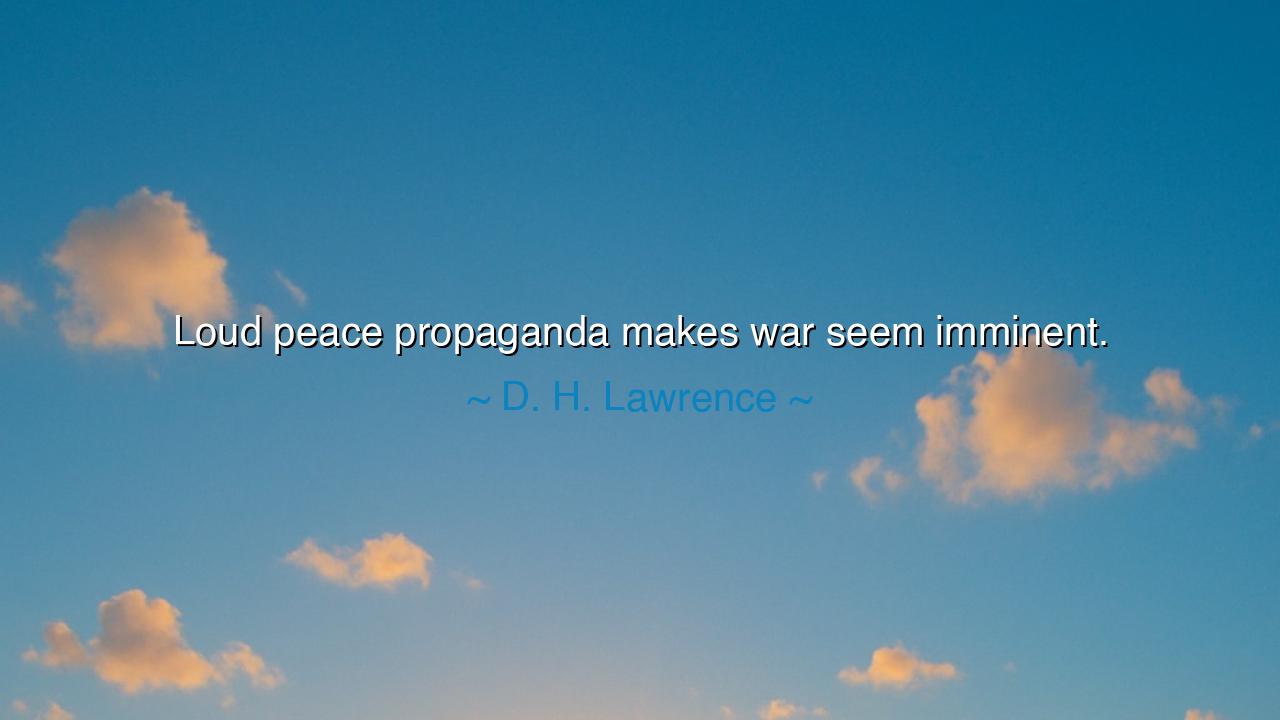
Loud peace propaganda makes war seem imminent.






“Loud peace propaganda makes war seem imminent.” Thus spoke D. H. Lawrence, with words as sharp as the edge of a blade and as unsettling as the silence before a storm. His meaning is layered with irony and sorrow: when rulers, nations, and voices cry too loudly of peace, it is often because they stand already at the brink of war. For true peace, when it lives and breathes, requires no trumpet; it is quiet, steady, and unforced. But when banners of peace are waved with desperate vigor, it is often a sign that conflict lies crouching just beyond the horizon.
The ancients knew this paradox. They said, “When the state builds statues of harmony, prepare for division.” Rome itself declared again and again its desire for peace, inscribing the words Pax Romana upon its monuments, yet it secured that peace only through conquest, bloodshed, and suppression. The louder Rome proclaimed its love of peace, the more legions it dispatched to the edges of its empire. In this way, Lawrence’s insight finds root in history: peace propaganda may be not the assurance of calm, but the herald of storm.
Consider the story of World War I. In the years before the Great War erupted, European leaders spoke often of peace. Conferences were held, treaties proclaimed, alliances signed under the banner of stability. Newspapers declared that war between great powers was impossible, for civilization had advanced beyond barbarism. And yet, these very proclamations rang so loudly because the ground beneath was trembling. Within months, those treaties and declarations collapsed into the trenches of Flanders and the Somme. The more fervently men insisted upon peace, the more fragile peace revealed itself to be.
Lawrence’s words also pierce to the heart of propaganda itself. Propaganda, whether for peace or for war, is not truth but performance. When leaders must constantly declare peace, it reveals that peace is not trusted, not secure, not believed in by the people. True peace is lived, not shouted. It is found in quiet dealings, honest compromises, and mutual respect. But false peace, cloaked in loud proclamations, conceals swords behind its banners and dread behind its smiles.
The lesson here is not to despise the pursuit of peace, but to be vigilant when peace becomes a slogan rather than a reality. If you hear endless shouting of peace, examine what lies beneath the words. Is there justice? Is there trust? Are grievances addressed, or are they buried under the noise of rhetoric? For without justice, peace is only a mask, and behind that mask lurks conflict ready to break free.
History offers us another example in the Cold War. Leaders of both East and West spoke often of peace while stockpiling nuclear arms that could annihilate the earth many times over. They held summits, issued declarations, and spread propaganda about their peaceful intentions. Yet the louder the voices of peace grew, the closer the world seemed to drift toward destruction. Only when quiet, patient diplomacy—backed by real action and trust—began to replace the noise of slogans did the iron tension begin to ease.
Practical wisdom follows: let your pursuit of peace be in deeds, not in empty words. Do not trumpet it so loudly that it becomes brittle, fragile, and unbelievable. Instead, live peace in the small things: in fairness, in dialogue, in reconciliation. For just as loud proclamations may signal weakness, quiet actions may reveal strength. True peace needs no boasting; it is steady, silent, and enduring.
So let Lawrence’s words be a warning for all generations: “Loud peace propaganda makes war seem imminent.” Do not be fooled by empty cries of peace, nor lulled by slogans that mask the gathering of arms. Seek instead the peace that is quiet, humble, and real, for it is that peace alone which endures beyond the noise of men and the clamor of nations.






TLTruong Thành Lọi
D.H. Lawrence seems to be pointing out the paradox in peace advocacy: if you push too loudly for peace, you might end up heightening the fear and tension that leads to war. It’s an interesting thought—how does this apply to modern peace efforts? Could this explain why some peace initiatives fail to have the desired effect? How do we balance the need for urgency with the calm needed to avoid escalating the situation?
TP6/4 Vu The Phong.29
Lawrence’s quote gives an interesting perspective on peace movements. If the propaganda for peace is too loud, could it actually provoke the opposite of what’s intended? It makes me think about how peace is often framed as something urgent or critical—does that urgency inadvertently make war feel like a logical outcome? How can we pursue peace without creating an atmosphere of tension that primes people for conflict instead of resolution?
TTAnh Mac thi tuyet
This quote from Lawrence really challenges the idea of peace activism. It’s almost as if he’s warning that the louder we shout for peace, the more we create an atmosphere that makes war feel inevitable. Can it be that pushing too hard for peace with forceful rhetoric only creates a counterreaction? How can we advocate for peace in a way that doesn’t stir up conflict or make war seem like the only alternative?
LLLinh La
D.H. Lawrence’s quote seems to suggest that the more we push for peace through loud, aggressive rhetoric, the more we may inadvertently escalate tensions. It makes me wonder: can peace truly be achieved through forceful campaigns or does it require a quieter, more organic approach? Is the loudness of peace propaganda a reflection of society’s own fear or unease? What’s the line between advocacy and aggression when it comes to peace?